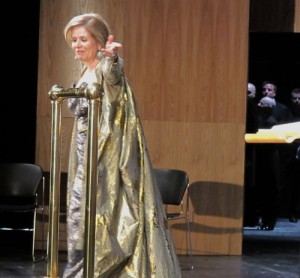Royal Opera House Covent Garden
R. Strauss: Capriccio, a concert performance
The Countess: Renee Fleming
Strauss’s last opera is once more about the nature of his art. Is the poet greater than the composer; is the librettist greater than the opera?
After Capriccio Strauss will compose the four last songs which of all music written harvests our midnight moments in plaintiff reminiscence. Those four last songs feed the ear with the bearded barely that the reaper gathered in early in life’s lost time and that still echo cheerly along the lone road we each must take to many towered Camelot. After the four last songs Strauss’s preoccupation with these questions of art – will – for many who love his music – pale into insignificance. Yet the questions Strauss poses in Capriccio and the equivocal answers he teases from his pose are hugely significant.
The conceit is the countess as a patron of the arts from some late baroque or early classical court holds sway over the rivalries between the poet; the composer and the impresario who makes their ideas work on stage. The notion is balanced but nevertheless as it is an opera the outcome of the debate is inevitably unbalanced. In the end music gives shape to all the various arguments and therefore music’s power sways – as Dryden once tellingly observed.
The Countess however who is to judge is unable to answer her own question in a final sense. It is to that refined sweetness that Strauss devotes this opera. The countess puts into musical line her preoccupations with her life line – love. here we return to the bittersweet of the Marschallin; also to Arabella; and perhaps to the princess in Der Frau Ohne Schatten – which was once memorably translated by a academic grandee of Queen Mary University as the woman with no shoes – no names no pack drill as they once said in the army.
In Capriccio though there is as ever compelling music for the voice and not least for the countess – the composer lavishes upon the Orchestra the final word or perhaps one should say essays the most telling music. In that deliberate choice Strauss tells us where his heart lies even if in his head he wants the poets to win the argument.
The closing thirty minutes of the opera include the most wonderful extended piece of mood-music ever penned. In it he catches – like later in the four last songs – something so profoundly felt of the beauty in the fragility of life’s transience that words melt before it like incense before an altar. This is followed by a long gentle aria which is rather akin in shape and scope to the long plaintive scene of the Marschallin alone in Act I of Der Rosenkavalier, save the countess is less preoccupied with herself and her fading charms than the Marschallin but though her troubles are grander and more noble her answer is no more certain or more profound.
Strauss wrote this for role a soprano and it has been a role that in its time has drawn great singers in their later careers to its mellifluous melodiousness. It is a role Renee Fleming has over recent years made her own. At Covent Garden she brought an elegiac fragility to the Countess which was deeply affecting.
Nevertheless this is an opera where for me the unsung hero remains the orchestral music. And I think that is what Strauss intended.

